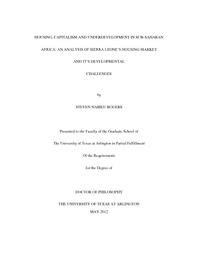
ATTENTION: The works hosted here are being migrated to a new repository that will consolidate resources, improve discoverability, and better show UTA's research impact on the global community. We will update authors as the migration progresses. Please see MavMatrix for more information.
Show simple item record
| dc.contributor.author | Rogers, Steven Nabieu | en_US |
| dc.date.accessioned | 2012-07-25T19:09:41Z | |
| dc.date.available | 2012-07-25T19:09:41Z | |
| dc.date.issued | 2012-07-25 | |
| dc.date.submitted | January 2012 | en_US |
| dc.identifier.other | DISS-11752 | en_US |
| dc.identifier.uri | http://hdl.handle.net/10106/11096 | |
| dc.description.abstract | The issue of available and affordable housing in Sub-Saharan Africa poses an overwhelming problem, and yet receives weak policy responses. Since independence, housing policies have shifted from ambitious schemes of state intervention to increasing emphasis on the private market. This shift coincided with the global economic trend that advocated for escalating privatization. The 1993 World Bank's housing "Enablement" policy became the blueprint for planning in developing countries. Despite decades of policy shift, housing outcomes foreshadow derelict housing structures, poorly structured mortgages and increased unaffordability for the urban poor. Critics have highlighted that the approach is biased towards the market, exclusionary in application, and disenfranchises the urban poor. But how these policy responses are articulated by local officials and how they impact the urban poor have not been well researched. This qualitative empirical research uses Freetown as a case to investigate this gap from a demand and supply perspective. Housing officials from seven institutions as well as forty household residents of the "Low-Cost" were interviewed to determine the articulation and impact of this approach on the urban poor. The research finds a huge policy mismatch in the housing sector because housing policies are driven by multiple non-shelter related variables that include, a) the quest for urban entrepreneurialism, b) the proliferation of "expert sense", c) a misleading interpretation of the private market's potential, and, d) lack of commitment to housing policies. This has led to increased displacement, uneven development, government abdication and conflict over competing use-value. While "Low-Cost" demonstrate that urban fortunes can be influenced by previously marginalized inhabitants despite power asymmetries, the emphasis on market actors in an economically frail country only disproportionately affects the poor. The relationship between housing supply and housing demand reflects the particular nature of housing provision in underdeveloped capitalist societies, highlighting the challenges faced by low-income homeowners. The research recommends an increased state regulation as necessary for an effective private market, the direct oversight of public investment, a realistic economic nationalism and focus on the informal housing market. | en_US |
| dc.description.sponsorship | Arvidson, Enid | en_US |
| dc.language.iso | en | en_US |
| dc.publisher | Urban & Public Affairs | en_US |
| dc.title | Housing, Capitalism And Underdevelopment In Sub-saharan Africa: An Analysis Of Sierra Leone's Housing Market And Its Developmental Challenges | en_US |
| dc.type | Ph.D. | en_US |
| dc.contributor.committeeChair | Arvidson, Enid | en_US |
| dc.degree.department | Urban & Public Affairs | en_US |
| dc.degree.discipline | Urban & Public Affairs | en_US |
| dc.degree.grantor | University of Texas at Arlington | en_US |
| dc.degree.level | doctoral | en_US |
| dc.degree.name | Ph.D. | en_US |
Files in this item
- Name:
- Rogers_uta_2502D_11752.pdf
- Size:
- 1.080Mb
- Format:
- PDF
This item appears in the following Collection(s)
Show simple item record


